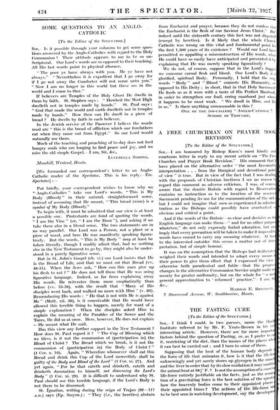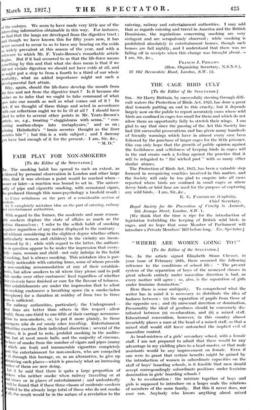THE FASTING COIF.
[To the Editor of the SPECTATOR.] SIR,--I think I cOukl, in Iwo 'guesses, nanie the Iles! Institute referred to. by Mr. F. Yeats-Brown in his CC interesting article." However, there are far more importa factors behind the question of Fasting; or, as I prefer to e- it, restricting" Of the diet, than the harries. of ihe places wht it can best be carried.out ; and! turn to tainie of them. Supposing that the heat of the human body depends the foree of life that animates it, hciw is it that the lite-fo unknowingly and yet surely stores up glycogen in the muse and the liver in order that by its slow oxidation it may mail* the animal heat at 981° F.? Is not the assumption of a ronsei life-force entirely justifiable on the facts, just as the assul tion of a gravitating force is the best solution of the quest how the heavenly bodies come to their app- ointed places their appointed times ? The actions izif the life-force g to be best seen in watching development, Say the develop111 of the embryo. We seem to have made very little use of the interesting information obtainable in this way. For instance, we find that the lungs are developed from the digestive tract ; ond though we have known this for fifty years now, it has never seemed to occur to us to have any bearing on the colds so widely prevalent at this season of the year, and with a reference to which Mr. F. Yeats-Brown's remarkable article begins. But if it had occurred to us that the life-force means something by this and that what.she does mean is that if we did not violate digestion we should not have colds at all, and so might put a stop to from a fourth to a third of our whole mortality, what an added importance might not such a developmental fact attain.
Why, again, should the life-force develop. the mouth from he face and not from the digestive tract ? Is it because she wishes us to infer that we ought to take command of what goes into our mouth as well as what comes out of it ? In fact. if we thought of these things and acted in accordance with our reflections ought we to be ill at all ? I should have liked to refer to several other points in Mr. Yeats-Brown's article, as, e.g., treating "sluggishness with senna," " con- rrting mutton-chops into metaphysics," and so on ; hoing Hehnholtz's "brain secretes thought as the liver eeretes bile" ; but this is a wide subject ; and I daresay .ou have had enough of it for the present.—I am, Sir, &c.,































































 Previous page
Previous page